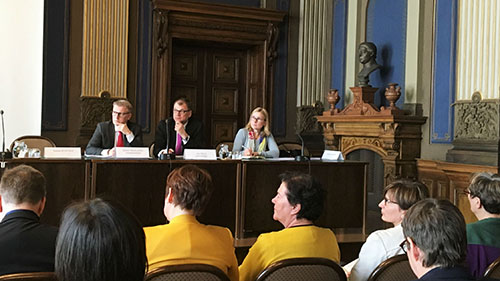Finnish National Commission on Sustainable Development talked about welfare economics and how wellbeing can be measured
Prime Minister Sipilä: Indicators for wellbeing parallel to the GDP as part of the development project on strategic indicators

The National Commission on Sustainable Development met on Tuesday 3 April to discuss how wellbeing could be measured and the sustainable development perspective given a stronger role in decision-making. The Finnish Parliament has called upon the Government to design indicators for welfare economics parallel especially to the GDP to promote sustainable welfare, and stresses the need for welfare impact assessment in all decision-making.
Prime Minister Juha Sipilä, who chairs the Commission, told that the topic was also discussed at the Government’s strategy session, where a decision was made to incorporate the consideration of indicators parallel to the GDP into the development project on strategic indicators.
State Secretary Paula Lehtomäki, Deputy Director General Juha Majanen and Senior Specialist Sami Pirkkala told about the recent progress made on incorporating sustainable development into the ministries’ work, Government annual report, monitoring system, and state budget. Reports by the ministries on the implementation of the Agenda 2030 in 2017 are being compiled and they will be submitted to the Parliament as part of the Government annual report. Sustainable development issues have also been incorporated into the foresight activities, while research, development and experimentation projects have been launched that support the implementation of the Agenda 2030 through various themes.
National sustainable development indicators have been published as a tool for monitoring Finland’s progress in implementing the national sustainable development goals. The monitoring system also enables everyone to comment on the indicator information and its interpretations.
Determined and systematic steps have been taken in the budgetary planning concerning sustainable development. According to Deputy Director General Majanen, in the budget for 2019 the level of ambition will be raised from last year’s sustainable development efforts. Besides extensive texts on sustainable development in general, an analysis will be included in the general reasons of the budget concerning the appropriation to be used for the focus area ‘carbon neutral and resource-wise Finland’. Majanen pointed out that the Ministry of Finance will be happy to participate in the development of indicators for wellbeing.
The members of the Commission welcomed the plans of the Ministry of Finance and stated that Finland’s achievements in budgeting sustainable development have also been noted in international contexts. The aim should also be to include sustainable development in the budget review, where it would gain wider publicity. It was also suggested that the next analysis on a specific appropriation could be made on focus area 2 ‘a non-discriminating, equal and competent Finland’.
The members of the Commission also strongly supported the idea of presenting Agenda 2030 and sustainable development as a key theme of Finland’s EU Presidency. A concrete proposal for the Presidency was that Finland would organise a major international conference on sustainable development, with measuring wellbeing as one of the main topics. Prime Minister Sipilä promised to take the proposal to the parliamentary working group responsible for the Presidency preparations.
At the meeting there was a lively discussion on strengthening the role of welfare economics in political decision-making. Also present in the discussion were Minister Kimmo Tiilikainen, Member of Parliament Susanna Huovinen, Chief Economist Jussi Ahokas from SOSTE, member of the expert panel, Director Jaakko Kiander from Ilmarinen, and student Aleksanteri Kekonen from the Agenda 2030 Youth Group. The topics on the agenda included the importance of long-term investments in wellbeing and work and inclusion, the key role of research information and monitoring indicators, extending the sustainability gap to themes other than those associated with economics, faith in the future among the young, and establishing the post of a Future Generations Ombudsman.
The participants again wished for further clarification of the concept of a sustainable economy and that putting environmental and social goals against each other would be avoided. The conclusion was that a sustainable economy is in fact about ecology: economies must function within the carrying capacity of nature but in a way that a sufficient amount of wellbeing is created while also seeing that it is evenly distributed.



